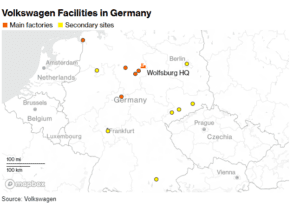Within the next week, New York will be bustling with people attending fashion shows, and brand events, and participating in Fall 2024 Fashion Week. Some of the biggest and emerging brands will showcase their work to the media and the public. This will be a major opportunity for media outlets to produce stories and for companies like Temu and Shein to observe closely. These clothing companies have revolutionized how consumers purchase, wear, and dispose of their clothing.
Over the past three decades, three technological shifts have transformed the fashion industry. First, in the early 2000s, advancements in data analytics, RFID, and localized supply chains fueled the rise of “fast fashion.” The following decade saw the rise of direct-to-consumer (DTC) brands, driven by internet-fueled e-commerce. This week provides a chance for fashion brands to engage with their clientele, but soon after, replicated pieces from the runways will appear on sites like Shein and Temu.
As of 2023, the fashion industry produced a staggering 97 million tons of waste annually, including 18 million tons of leftover textiles, 2.5 million tons of chemical waste, and 3 million tons of packaging materials. With the growth of these sites and the rise of micro-trends driving consumerism, the fashion supply chain is rapidly evolving, leaving significant environmental challenges for future generations.
Now Let’s Get to The Supply Chain & Logistics News for the Week!
EcoVadis Acquires Ulula to Improve Human Rights Impact
 Earlier this week, EcoVadis, the sustainability intelligence and verification platform, announced its acquisition of the human rights technology platform Ulula. Ulula utilizes analytics to improve the working conditions for workers across global supply chains. Ulula’s worker engagement platform, with its on-the-ground presence, will strengthen the depth and reliability of EcoVadis’ range of solutions offered to customers throughout their supply chains, promoting responsible and equitable employment practices globally. The Ulula platform will enhance EcoVadis’ data by providing insights through automated surveys, grievance management, and analytics. This technology enables companies to directly engage workers and communities, identify labor rights risks, generate actionable insights from real-time data, and facilitate remediation efforts.
Earlier this week, EcoVadis, the sustainability intelligence and verification platform, announced its acquisition of the human rights technology platform Ulula. Ulula utilizes analytics to improve the working conditions for workers across global supply chains. Ulula’s worker engagement platform, with its on-the-ground presence, will strengthen the depth and reliability of EcoVadis’ range of solutions offered to customers throughout their supply chains, promoting responsible and equitable employment practices globally. The Ulula platform will enhance EcoVadis’ data by providing insights through automated surveys, grievance management, and analytics. This technology enables companies to directly engage workers and communities, identify labor rights risks, generate actionable insights from real-time data, and facilitate remediation efforts.
US Safety Commisioners Launch Probe into Shein and Temu
Two U.S. Consumer Products Safety Commission (CPSC) leaders are urging an investigation into e-commerce retailers Shein and Temu after both sold dangerous baby and toddler products. Commissioners Peter Feldman and Douglas Dziak want the agency to examine how foreign-owned platforms like Shein (Singapore) and Temu (China) comply with CPSC rules, manage third-party sellers, and represent imported goods. Both companies use the “de minimis” rule, which exempts packages valued under $800 from tariffs, raising concerns. Shein and Temu pledged to cooperate with investigations and strengthen compliance, though both face criticism for low product quality and their use of de minimis. Lawmakers are considering eliminating this tariff exemption. A Shein spokesperson said the company is investing millions of dollars into strengthening its compliance programs. Earlier this year, Shein announced it would pour $50 million into compliance programs to strictly adhere to product safety standards and local laws and regulations.

 VW Reveals Plans to Shut Down German Factories as Sales Slouch
VW Reveals Plans to Shut Down German Factories as Sales Slouch
Demand in Europe has not recovered since the pandemic, with auto-deliveries across the industry around 2 million short of a historical peak. Volkswagen has lost an estimated 500,000 car sales, equivalent to around two plants. The biggest European automaker announced that it is considering shutting down sites for the first time in Germany and ending job security agreements after continued overcapacity and lack of competitiveness. Additionally, with fears about Chinese automakers entering the market and a growing appetite for EVs the VW board is under immense stress and is battling many fronts.
Piedmont Lithium pulls US government loan applications


Piedmont Lithium has pulled its application for a U.S. government loan and scaled back its expansion plans due to an 83% drop in lithium prices, driven by Chinese overproduction and slower EV sales. This move follows the cancellation of a Tennessee project, which had received a $141.7 million grant, as the company now focuses on its flagship North Carolina project. The company has also delayed plans for its North Carolina refinery and is facing challenges with local authorities and financing. Piedmont, which has laid off staff and sold shares in other ventures to conserve cash, remains dependent on its Quebec project for funding. Piedmont was founded in 2016 in Australia and moved its headquarters in 2021 to North Carolina, where it hopes to dig a 500-foot-deep (150-meter-deep) open-pit mine and build one of the largest U.S. lithium refineries. Piedmont, which reported $59 million in cash at the end of June, laid off nearly a third of its workforce earlier this year. Since last October, the company has spent $1.9 million on DOE loan application-related costs and stock and transaction-related expenses.
FedEx Announces Majors Investment in AI Robotics Company “Nimble” to Boost its Supply Chain Business


FedEx announced an investment in AI robotics and autonomous technology company Nimble to enhance its Fulfillment unit, which supports small and medium-sized businesses in managing orders and inventory. This investment aims to streamline FedEx’s supply chain capabilities and improve efficiency as freight demand remains low. The partnership with Nimble will help scale FedEx’s e-commerce offerings across North America through automated third-party logistics solutions. The size of the investment was not disclosed.
Song of the Week:




















